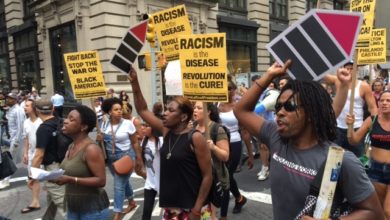Voters in Detroit, a majority-Black city, will have the opportunity Nov. 2 to join a growing number of cities across the United States in pursuing reparations for racism against the African American population.
The Detroit resolution, spearheaded by Detroit City Councilmembers Mary Sheffield and Keith Williams, chair of the Michigan Black Democratic Caucus, is listed on the ballot as Proposal R. The measure reads: “Should the City of Detroit establish a Reparations Committee to make recommendations for housing and economic development programs that address historical discrimination against the Black community in Detroit?”
Although the federal government has continually refused to address the issue of reparations, a growing movement is giving life to this struggle.
The effort to have cities pursue reparations for African American residents is being promoted across the United States by Mayors Organized for Reparations and Equity, a coalition including the mayors of Los Angeles; Denver; St. Louis; Tullahassee, Okla.; Providence, R.I.; Austin, Tex.; Kansas City, Mo.; Sacramento and Stockton, Calif.; St. Paul, Minn.; and Durham, Asheville and Carrboro, N.C. A reparations resolution has already been adopted in Evanston, Ill.
There are many aspects to the struggle for reparations dating back to the era of slavery and the role banks played in the appalling kidnapping and trade of human beings from Africa. The raising of these resolutions today presents an opportunity to once again demand justice from these racist institutions for their reprehensible legacy.
It also presents an opportunity to demand the banks and financial institutions pay reparations for their more recent crimes against humanity. Almost 10 million families lost their homes to mortgage foreclosures from 2006 to 2014. This displacement occurred due to the widespread, deliberately predatory and criminal subprime lending practices especially directed against African Americans and other people of color.
Bank schemes hit Detroit hard
As the city with the highest rate of Black home ownership prior to the subprime lending assault, Detroit was particularly hard hit by the banks’ criminal practices. From 2005 to 2015, 65,000 Detroit families lost their homes due to mortgage foreclosures, a product of the $4 billion in subprime loans — loans at least 3% above the standard interest rate — written within the four years prior to the 2008 housing and financial crash.
Fifty-six percent of all mortgage foreclosures in Detroit became blighted properties or were foreclosed again for nonpayment of taxes, a product of overassessments that were also part of the banks’ lending practices. Since 2005, 139,699 of Detroit’s 384,672 homes were foreclosed because of mortgage defaults or unpaid taxes. The city’s population was reduced from about 1 million people in 2000 to 637,000 people today, with the bulk of that reduction from 2005 to 2010.
Every single bank was a participant in this war on Detroit homeowners which led to the destruction of Detroit’s once-proud neighborhoods, leaving the city looking like a wasteland with empty fields and boarded-up buildings where homes once stood.
This was a criminal enterprise where the banks and financial institutions trained agents to go into oppressed neighborhoods, entice Black homeowners into refinancing their homes for home repairs or to pay medical bills, and then sign them into fraudulent subprime loans. These loans had low teaser rates for the first year, which adjusted upward in every succeeding year, resulting in exorbitant, usurious payments the banks knew could not be met.
The banks then bundled the loans into security instruments which they sold on Wall Street, making eight times the profit on instruments associated with these exotic loan products as compared to the rate of profit on fixed-rate mortgages. The banks paid the ratings agencies, Moody’s and Standard and Poor’s, to give the subprime bonds their highest ratings despite their fraudulent character, which meant that defaults were inevitable.
Banks must be held accountable
When the housing market inevitably collapsed, the federal government bailed out these same criminal banks. The feds gave the banks a $700 billion direct bailout. But even more significantly, they nationalized Fannie Mae and Freddie Mac, insurers of the mortgages, which then paid the banks full value for the fraudulent loans. The federal government, under Presidents George W. Bush and Barack Obama, then carried out mass evictions across the United States on behalf of these financial institutions.
The economic collapse of municipal revenues due to this wholesale loss of population and home ownership led to cities like Detroit issuing bonds to fund operations. These municipal bonds were characterized by fraud as well, tied to interest rate swaps and other schemes that made them unpayable. This in turn led to Detroit being taken over by an unelected emergency manager who took the city into bankruptcy to ensure the bondholders would get their payments. In the largest municipal bankruptcy in U.S. history, Detroit’s assets and services were privatized, City of Detroit pensioners were deprived of their earned retirement benefits, and massive water shutoffs that continue to this day were started in the city.
The setting up of a Reparations Commission offers Detroiters the opportunity to go after the banks for repayment of stolen wealth and the massive destruction they caused to this once-great Black city.
These banks, most of whom were active participants in the slave trade, must be held accountable. The trillions they owe the people must be repaid so the workers and oppressed can rebuild Detroit. A ‘yes’ vote on Proposal R is an important step in this process and in advancing the reparations struggle across the United States.
Feature photo: Protesters inside Bank of America in downtown Detroit demand justice, June 2014. Liberation photo






